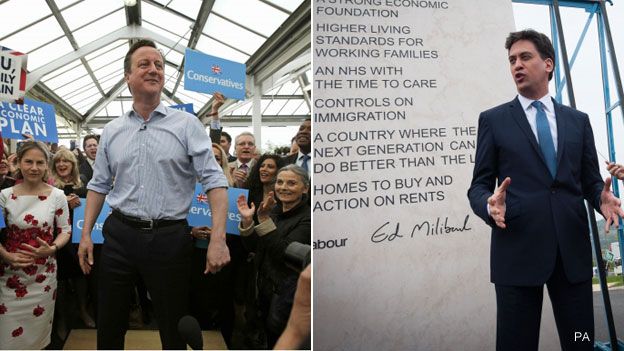Election 2015: It wasn't meant to be like this
- Published

This isn't how this election was meant to go.
It's been marked by the lack of confidence felt by our political leaders rooted in the overwhelming lack of trust felt by most voters.
Why else would David Cameron promise to pass a law - not mentioned in his own manifesto - which would stop himself putting up taxes he's long pledged not to raise?
Why else would Ed Miliband resort to "carving in stone" pledges so broad and so general that it would be almost impossible to judge whether they've ever been broken?
Why else would we see the relentless political cross-dressing as the Tories promised to become the party of the workers and Labour the party of economic responsibility?
The two big parties have even been too nervous to follow the classic campaign themes.
Governing parties tend to tell voters that the "country's on the right track, don't turn back". Yet with the age of austerity far from over the Conservatives have struggled to sound a note that sounds that optimistic. They have, instead, simply urged voters to stick to a plan which has only just begun to bring better times to some, or to risk chaos by abandoning it.
Opposition parties classically declare that it's "time for a change". Labour too have lacked the self belief to make that appeal boldly - simply claiming instead to have "a better plan".
Electoral wound
There is, of course, one leader who has not suffered from lack of confidence or, apparently, from lack of trust. The undoubted star of this campaign is Nicola Sturgeon. This is true even though she isn't in fact running in this election. The vast majority of people in the UK can't vote for her party but no-one, even in Scotland, can vote for her. Perhaps that is the secret to electoral success!
The Tory press have dubbed the SNP leader "the most dangerous woman in Britain" even though this election would be as good as over and Labour home and dry if it weren't for her extraordinary success. The loss of, perhaps, dozens of seats in its former Scottish stronghold is what makes this election too close to call.
Both Labour and the Tories originally planned for this campaign believing that if they were neck-and-neck on polling day Ed Miliband would walk into Number 10 - as, under our existing boundaries, it takes fewer votes to elect a Labour than a Tory MP.
What's more the Tories do not appear to have done enough to staunch the electoral wound caused by the rise of UKIP while Labour seem to have kept a firm grip on the crutch provided to them by the collapse of Lib Dem support.
This uncertainty has offered the Lib Dems a potential lifeline. Written off by many before the campaign they have ended it by reminding voters that they may be a more attractive partner for either of the big two than any of the alternatives.
If the campaign has often felt narrow and introverted the arguments that will follow an uncertain result could raise some of the biggest issues in our country - the future of the UK, our membership of the EU and the fairness of our democracy.
Not only that but it may raise the prospect of another election coming along sooner than we originally thought.
That may give me the chance to do what I've been unable to do for much of this campaign as I've had to follow much of it from my sickbed.
I'm all too aware, though, that the thought of another few weeks like the last may be enough to make most people feel pretty unwell.
BBC News Timeliner
Winners and losers. Laughter and tears. Celebrities and the general public. Find echoes of the current campaign on a trip through the archive of elections past.